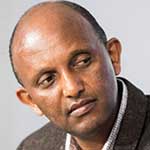
Commentaries | Dec 31,2022
Nov 5 , 2022
By Abraham Tekle
Pretoria’s agreement between delegates of the federal government and the TPLF to cease hostilities positively signals that the civil war will end soon. But the world must take action to save lives. Humanitarian intervention is needed to prevent mass starvation.
The dreadful food insecurity in conflict-affected areas requires humanitarian funding from the international community. Despite improvements in humanitarian assistance after the United Nations and non-governmental organisations’ valiant attempts to address the obstruction of aid operations, the recent resumption of full-blown war had undone that progress. Food aid to the people in and around Tigray was blocked.
Now the warring parties have agreed to stop shooting, humanitarian assistance must resume.
It was reported that the country is at risk of conflict-induced famine. Such widespread suffering resulted from the direct and indirect consequences of conflict and violence along with the behaviour of the fighting parties. In extreme cases, such actors deliberately cut off access to the commercial supplies and essential services civilians rely on to survive. Hunger is used as a tactic of war.
Approximately 20 million people face high levels of food insecurity, of which 13 million are victims of war-related famine that need life-saving food assistance. Withstanding this, the underscored conflict impacts every aspect of agrifood systems, reducing production, destroying crops, disrupting markets and restricting access in the north. This will lead to a complete disruption of livelihoods and mass displacements if not addressed soon.
It is essential for the government, warring forces and the world to act now to arrest the calamities facing the people. Preventing conflict is the most effective means of avoiding famine.
Although humanitarian assistance is essential, it does not solve related problems. The solution is durable peace, which means putting pressure on all parties to keep their promises and contribute their share to the well-being of citizens.
Ethiopia and the Horn of Africa have been prone to multiple non-military interventions distributing aid and saving thousands of lives. During Sudan’s civil war from the late 1980s to the early 2000s, airlift operations brought help into rebel-occupied areas of southern Sudan that were inaccessible to UN agencies. Similarly, a cross-border humanitarian operation from Sudan into insurgent-held territory in Tigray and Eritrea lasted for a decade from 1981.
These examples affirm that more aggressive options should be urged to reach areas prone to drought and affected by an ongoing militarised conflict.
Spoilers’ intervention should be put into account. Spoilers are unconventional conflict drivers. Whatever their intention, they exaserbate the already worsened security and humanitarian situations. It has been witnessed that humanitarian organisations often face impediments and harassment on their staff and the looting of their assets. Lack of international funding threatens the operation. The government and humanitarian agencies must ensure security, using maximum efforts to provide aid and identify the aggressors.
Vigorously pursuing peaceful negotiations is a solution for conflict resolution. It is too vital to encourage the state and armed groups to abide by their obligations under international law, ensuring a rapid, unimpeded passage for humanitarians. Resuming aid is crucial now.
PUBLISHED ON
Nov 05,2022 [ VOL
23 , NO
1175]


Commentaries | Dec 31,2022

Sunday with Eden | Mar 16,2019

Verbatim | Dec 10,2018

View From Arada | Apr 15,2023

Sponsored Contents | Nov 28,2024

Radar | Apr 03,2023

Verbatim | Nov 29,2020

Radar | Feb 06,2021

Commentaries | Oct 01,2022

Radar | Jun 24,2023

Photo Gallery | 178283 Views | May 06,2019

Photo Gallery | 168488 Views | Apr 26,2019

Photo Gallery | 159269 Views | Oct 06,2021

My Opinion | 137059 Views | Aug 14,2021
Commentaries | Oct 25,2025

Dec 22 , 2024 . By TIZITA SHEWAFERAW
Charged with transforming colossal state-owned enterprises into modern and competitiv...

Aug 18 , 2024 . By AKSAH ITALO
Although predictable Yonas Zerihun's job in the ride-hailing service is not immune to...

Jul 28 , 2024 . By TIZITA SHEWAFERAW
Unhabitual, perhaps too many, Samuel Gebreyohannes, 38, used to occasionally enjoy a couple of beers at breakfast. However, he recently swit...

Jul 13 , 2024 . By AKSAH ITALO
Investors who rely on tractors, trucks, and field vehicles for commuting, transporting commodities, and f...

Oct 25 , 2025
The regulatory machinery is on overdrive. In only two years, no fewer than 35 new pro...

Oct 18 , 2025
The political establishment, notably the ruling party and its top brass, has become p...

Oct 11 , 2025
Ladislas Farago, a roving Associated Press (AP) correspondent, arrived in Ethiopia in...

Oct 4 , 2025
Eyob Tekalegn (PhD) had been in the Governor's chair for only weeks when, on Septembe...

Oct 25 , 2025 . By YITBAREK GETACHEW
Officials of the Addis Abeba's Education Bureau have embarked on an ambitious experim...

Oct 26 , 2025 . By YITBAREK GETACHEW
The federal government is making a landmark shift in its investment incentive regime...

Oct 29 , 2025 . By NAHOM AYELE
The National Bank of Ethiopia (NBE) is preparing to issue a directive that will funda...

Oct 26 , 2025 . By SURAFEL MULUGETA
A community of booksellers shadowing the Ethiopian National Theatre has been jolted b...